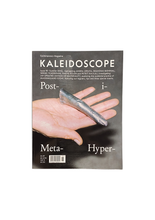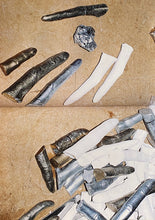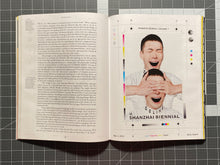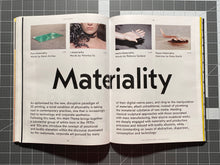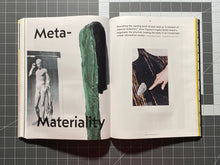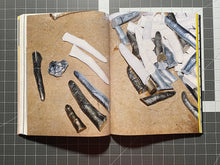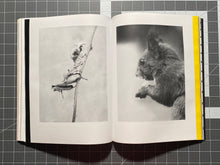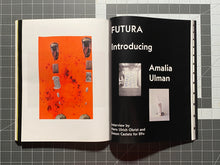KALEIDOSCOPE #18 – Summer 2013 – Post-i-Meta-Hyper-Materiality
Kaleidoscope
Regular price
$28.00
Sale
Summer issue, highlighting Andra Ursuta, Shanzhai Biennial, Sergei Tcherepnin, Yngve Holen and Petrit Halilaj; investigating an updated notion of materiality (with Nicolas Deshayes, Steve Bishop, Marlie Mul, Magali Reus, Ben Schumacher, Alice Channer, Pamela Rosenkranz, Alisa Baremboym...); exploring the curatorial practice of Massimiliano Gioni; featuring regulars, tips, and three special inserts (Benjamin Senior, Jochen Lempert et Sterling Ruby).
The issue's opening section of Hilights features Andra Ursuta, whose practice is understood by Joanna Fiduccia as committed to annihilating sculpture's distance from our world; the fashion-label-cum-art-project Shanzhai Biennial, whose tangible products, explains Kevin McGarry, are eclipsed by their collateral evidence; Sergei Tcherepnin, described by Lawrence Kumpf as creating a complex system of bodily configurations and social situations; Yngve Holen, whose works are read by Pablo Larios as sentient beings concerned with frustrated circulation, technological growth and associative networking; and Petrit Halilaj whose practice is framed by Elena Filipovic as rejecting pathos in favor of an intimate and critical inflection of the political.
The Main Theme section, titled Post-i-Meta-Hyper-Materiality, brings together a substantial group of artists who introduce the concept of emotional and bodily alienation within the discourse dominated by the readymade, corporate art pursued by many of their digital-native peers. The elusive sculptural works of Nicholas Deshayes, Steve Bishop, Marlie Mul, Magali Reus, Ben Schumacher and Alice Channer are framed by Karen Archey as deeply engaged with materiality and production processes and imbued with bodily allusions, while also commenting on issues of abstraction, dispersion, consumption and technology. A visual essay curated by fashion futurologist Veronica So reveals how, from sculptures designed by digital simulations to edible candies formed by human body scans, the appearance of 3D printing kicks off a range of playful experiments with technology and originality. Also in this section, Alice Channer talks to Rebecca Geldard about the starting point of each work, which she describes as “a moment of material seduction”; and artists Pamela Rosenkranz and Alisa Baremboym discuss physicality versus technology and the shifting boundaries between our bodies and the external world in a cross-interview by Ruba Katrib.
Comprising an essay by Jonathan Griffin, an interview by Francesco Manacorda and a photographic portrait by Ari Marcopoulos, this issue's Mono is devoted to the Director of the International Art Exhibition at this year's Venice Biennale, Massimiliano Gioni. Pragmatic bordering on opportunistic throughout his adventurous career, and yet described as “a hopeless romantic” by one of his most affectionate colleagues, Gioni states that his own failure to understand is what fuels his interest in art. Generally averse to chronological or historically comprehensive presentations and departing from the tautology of the masterpiece, he is instead a proponent of Outsider and self-taught art. His exhibitions, which he defines as products of a collective intelligence, are often concerned with the position of art within our image-based society, as well as the sites of an exploration of interior worlds, dream states and psychological visions.
Finally, it this issue's Regulars, Hans Ulrich Obrist and Simon Castets interview emerging artist Amalia Ulman; Gary Carrion-Murayari stages a three-way interview with Valentin Carron and Isabelle Cornaro; Felix Burrichter meets design critic Alice Rawsthorn; Leung Chi Wo, David Clarke and Lam Tung-pang engage in a round table about the art scene in Hong Kong then and now; finally, Laura McLean-Ferristraces the legacy of folk in British contemporary art from the exhibition Black Eyes and Lemonade to the practice of Jeremy Deller.
The edition is enriched by our seasonal Tips on following, reading, listening, stopping by, meeting and visiting; as well as by three Special Inserts, including a selection of paintings by Benjamin Senior, photographs by Jochen Lempert and collages by Sterling Ruby.
published in July 2013
English edition
22 x 28,5 cm (softcover)
228 pages (ill.)
Kaleidoscope magazine is an Milan-based international quarterly of contemporary art and culture, offering a timely guide to the present (but also to the past and possible futures) with an interdisciplinary and unconventional approach.









